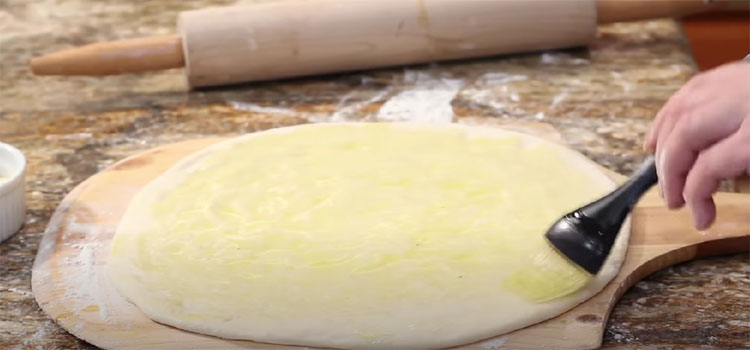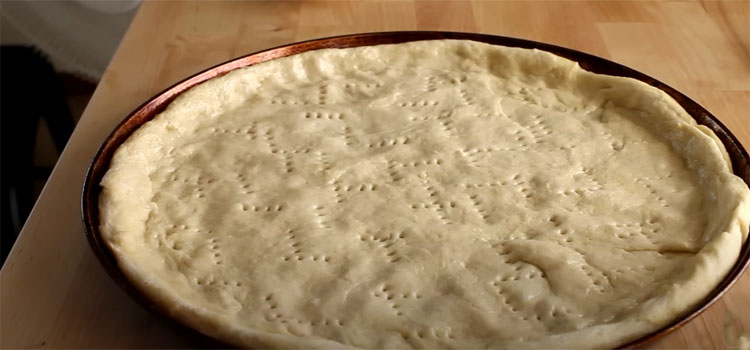Last Updated on September 15, 2024 by Shari Mason
Have you ever **scratched your head** wondering why **oil** goes into your pizza dough? What’s behind using oil in pizza dough? Each time I whip up meals at home, this question tickled my brain.
Today, we’ll investigate the impact of oil on pizza dough. Does it influence the texture, taste, or something else? Read on.
5 Reasons Why We Add Oil To Pizza Dough


- Texture: Oil enhances the dough’s texture, making it soft, smooth, and pliable. It gives the dough a delightful tenderness, creating the perfect canvas for your pizza masterpiece.
- Ease of Working: Ever struggled with stiff and challenging dough? Fear not! Oil’s presence makes the dough easier to work with, allowing you to stretch and shape it effortlessly into the desired thickness and size.
- Flavor Infusion: Oil isn’t just about texture; it also imparts a subtle yet delightful richness to the dough. This adds a touch of flavor that complements the toppings and sauce, making every bite a delight to savor.
- Moisture Retention: Oil helps retain moisture in the dough, preventing it from becoming dry or tough during baking. This ensures a luscious, moist crust that keeps you returning for more.
- Crust Appearance: Ever wondered how some pizza crusts have that golden-brown, slightly shiny finish? It’s the work of oil! When baked, the oil creates a beautiful sheen on the crust, enhancing its appearance and inviting you to take that first delicious bite.
Read:
Which Type Of Oil Should I Use for Pizza Dough?
When choosing the perfect oil for your pizza dough, simplicity is vital. Opt for neutral-flavored oils like olive, vegetable, or canola [1].
These oils blend harmoniously with the dough, allowing the flavors of the crust and toppings to shine.
“If I could eat whatever I wanted daily, I would have Domino’s pizza with pasta carbonara inside every slice. And at night, I would have Neapolitan ice cream until I felt toxic. And then I would drift off telling myself, ‘It’s going to be O.K… It’s going to be O.K. you’re going to train in the morning.”
– Robert Downey, Jr., American Actor
Among them, olive oil adds a subtle hint of fruity notes, elevating the taste without overpowering the essence of your pizza.
Read: How Does Pizza Hut Make Their Pizza?
How Much Oil Should I Use In Pizza Dough?
Regarding the amount of oil to use in your pizza dough, a general rule of thumb is to add 2 to 3 tablespoons per standard pizza dough recipe. This ensures a soft and pliable dough that bakes to perfection.
However, adjust the quantity according to your taste and desired crust texture. So, grab your measuring spoons and find the perfect balance of oil that suits your pizza-making journey.
Can I Skip The Oil In Pizza Dough?


Yes. If you prefer a leaner and slightly chewier crust, you can skip the oil in your pizza dough without sacrificing the overall quality of your creation.
While oil adds tenderness and flavor to the dough, going oil-free can still result in a delicious pizza experience.
With a pinch of culinary creativity, you can craft a delectable pizza [2] that suits your unique preferences.
Is There A Specific Time To Add Oil To Pizza Dough?
Combining the flour, water, yeast, and salt during the initial mixing process perfectly incorporates the oil.
Adding it at this stage evenly distributes the oil throughout the dough, ensuring it works its magic to enhance texture and flavor.
“In the dance of pizza-making, the oil adds the graceful touch that makes the dough twirl with tenderness and flavor.”
– Eat Pallet Restaurant & Food Advice
So, remember to blend in the oil with the other ingredients right from the start, and watch as your dough transforms into a perfect canvas for your pizza masterpieces.
Also Read: How Long Does It Take To Cook A DiGiorno Pizza?
FAQs
u003cstrongu003eIs it better to make pizza dough with butter or oil?u003c/strongu003e
When choosing between butter and oil, both have their unique charms. Oil creates a soft and tender dough, while butter adds a rich and flavorful touch. u003cbru003eu003cbru003eThe choice ultimately depends on personal preference and your crust’s desired texture and taste.
u003cstrongu003eDoes oil help pizza dough rise?u003c/strongu003e
While oil does not directly aid in the rising process like yeast, it does play a crucial role in the overall texture and flexibility of the dough. u003cbru003eu003cbru003eBy enhancing the dough’s softness and moisture retention, the oil creates an environment conducive to a successful rise. u003cbru003eu003cbru003eIt complements the work of yeast, ensuring a delightful, well-risen crust. So, while not a rising agent, oil contributes to the magic of pizza dough, making every bite a slice of heaven.
In Conclusion
In pizza-making, the oil adds its unique touch to the dough. It creates a soft and tender texture, making the dough easy to work with.
Oil also enhances the flavor, complementing the crust and toppings perfectly. While it doesn’t help the dough rise, its presence contributes to a well-rounded pizza experience.
References:
- https://www.healthline.com/nutrition/is-canola-oil-healthy
- https://www.seriouseats.com/pizza-recipes-5117816
- Can You Put an AC Unit in the Kitchen? - September 27, 2024
- What Cheese Does Olive Garden Use? Discover Their Signature - September 27, 2024
- How to Cancel a Pizza Hut Order? Quick & Easy Guide - September 24, 2024


